

PopEntertainment.com
> Oscar Nominees
>
Feature Interviews - Actors >
Feature Interviews A
to E > Presley Chweneyagae
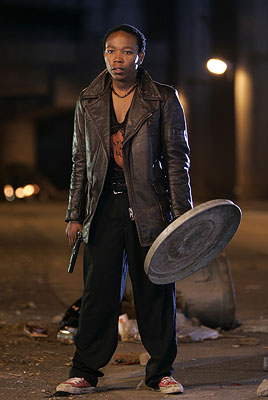 PRESLEY
CHWENEYAGAE
PRESLEY
CHWENEYAGAE
BREAKS OUT FROM TOWNSHIP KID TO
OSCAR NOMINEE
by Brad Balfour
Copyright ©2006 PopEntertainment.com. All rights reserved.
Posted:
March 11, 2006.
For Presley
Chweneyagae, making Tsotsi was more than just a job or a spotlight;
it was an act of redemption for a kid from a small poor town from the
northwest province of Mafikeng who made the transition from local actor to
international star of an Oscar-nominated film. Thanks to South African
director Gavin Hood, this young guy from a tough neighborhood was able to
construct the life of a mentally deranged thug ('tsotsi") and criminal
gang leader, showing his human side both because of that experience and in
spite of it as well.
Were you surprised
at how brutal you became when you saw yourself on screen?
Yes, definitely. It
was like asking myself, "Are you capable of doing that?” [laughs]
Except for Butcher,
the gang member who shanked the people, you were a pretty nasty guy.
Yes, I was a pretty
nasty, but it's probably because I grew up around guys like him, so it was
easy to relate to. Plus, it was just a lot of cut and paste [laughs]
of all these people.
You grew up around
killers?
Yes. It was tough.
There were people stabbing each like in the daylight and stuff like that.
You grew up pretty
much after apartheid. How old are you now?
Yeah, pretty much.
I'm 21, sir.
Apartheid was more
than 10 years ago? [The first democratic election was in 1994; the system
was coming apart around 1990.]
I was born in a
northwest province in 1984.
So you pretty much
missed it. Was it interesting to talk to people who experienced it?
Definitely. Because
I've read books about apartheid, I kind of learned a lot [about it] but
people look at me funny because I don't really understand it. I guess
that's what you say, like when you go out or someone just calls you a "kafir"
[a derogatory word originally meaning non-believer but in connotation
meaning the N-word] you think "Oh so what." It doesn't really get to me
the way it does to a person who experienced the whole thing.
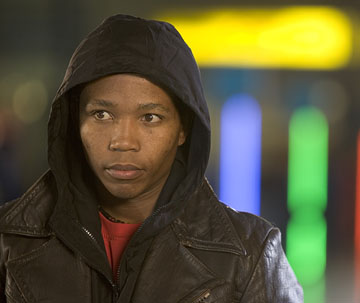 What attracted you
to this project?
What attracted you
to this project?
I read Athol
Fugard's plays like Blood Knot so I had an interest in the
beginning. But to realize that the book, Tsotsi, the real novel,
was written by Athol Fugard, I had to read the script twice then I got an
interest. I said, "I can play this part. I can find this kind of element
in me," if you know what I mean. So it was really that reason, and that
I've always had a passion for films, even though I did a lot of theater,
because I watched a lot. In that first meeting with Gavin, I realized that
he was really passionate about his work and meeting a director like
that... what more do you need? I had already prepared a scene for that
interview so in the little time we had together I got a gist of what he
wanted from his actors, and then I auditioned after that. I said I wanted
to read for them both. And he said, "Ok come back and do them both."
Were you familiar
with Athol Fugard's work?
I had read a lot of
his work at school, just before they kicked me out. It was a technical
because I was working and was away for three months. So I read his plays
and I've seen his work performed. I've always heard of this good
playwright named Athol Fugard when I was growing up. So it was an honor
for me to be in his work.
What did you learn
from reading his work?
I always like to get
that experience. All along when I've read about Athol Fugard and guys like
writer/director Barney Simon [founder of The Company, a non-racial theater
group, and the Market Theatre] I realized there were more opportunities
for black brothers in terms of theatres. They use to do these plays at the
Market Theatre [in Johannesburg]. Just after 1994, when I started to get
involved in the arts, I used to watch these protest plays, and protest
theatre. That kind of theatre didn't really interest me at the time. Then
I was interested in Shakespeare, I guess, because I just didn't grow up in
that generation so it was hard to relate to it. That's why I don't get
bothered when someone just swears at me and he's white. I just say, "Fuck
it." I don't really understand the whole thing about apartheid and stuff.
But I know there was apartheid and I know there has been controversy and
all that but I'm just not there. My mind frame is somewhere else.
It's not in the past.
What in your
experience helped to do this movie?
I was able to do
this because I started acting a long time ago. In 1996, I started doing
plays like Jack in the Box but it was my mom [who encouraged me]
because I grew up in a rough town. So my mom didn't want me to end up like
most of the guys I knew, she wanted me to do drama. I did plays like
Red Ball and later on I did Shakespeare – Hamlet and King
Lear – and when I was doing Hamlet at The State Theater [in the
capital city of Pretoria where had had moved when he got this role], an
agent saw me there. I was still doing my matric and she said to me, finish
your matric first and then we can talk.
Matriculation
classes are at the end of high school?
Yeah, that's when I
got the script and had a meeting with Gavin. So I asked him if I could do
it [the part of] Tsotsi. But initially I auditioned for Butcher.
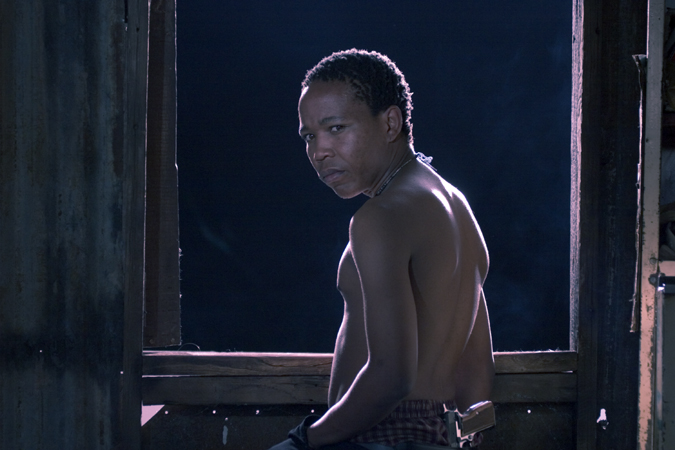 When you two were
working together, did you turn to him and get a sense on how to see and
experience things?
When you two were
working together, did you turn to him and get a sense on how to see and
experience things?
Yes I felt that
experience I had was enough to make me welcome my character. He told me
the story about his mother being robbed and jacked twice. So we did have
that but we didn't want to focus on the past. What we focused on was the
story in the present. How the history has affected us but we can still do
something with it instead of be all pissed off and angry at the world.
How about the
transition, was it instinctual because you were trained in theater?
It was Gavin's
direction and it was a whole lot of inspired acting and drawing deeply
into myself. And I did not think about my character. I wasn't really
thinking that the character has to change. I was just following the path.
Like where the character goes. I followed the character. It wasn't really
something that I thought about.
Were you nervous
making a film since you're a theater actor?
[Laughs]
When I'm working I don't really think. I just think the character so I
don't really. You think about it after and when you look at it, it's like,
[making a sound like "a-a-y"] I fucked up. Oh I'm sorry...
It's okay, In
America we say fuck a lot. When you saw yourself on screen were you
surprised at your transition?
When they first
showed the clips, I walked out. I couldn't look at myself acting because I
was feeling like that all over again. So it took sometime before I got
used to seeing myself on screen. But still when I look at the screen I
don't look at the movie to judge myself or judge other people's
performances. In a different eye, but there's nothing I could have said
like I should have done that but… I don't know what to say. I can't really
say, ok now I can see I'm changing. I can't really think.
Was part of the
secret about the making of this film in building a community with the
other actors?
The way Tsotsi's
character is, he's kind of on an island. He isolates himself from a whole
lot of people. So obviously I was nice to them. They were experiencing,
you know, as actors, they have egos, you get on set and you see this
little boy who's Presley. So I just stayed in my space. I talked to them
when I had to talk to them and we chatted. But it wasn't a matter of going
out all the time. I think with me it was quite great because we didn't
know each other very well, so it was easy for me to storm up and hold back.
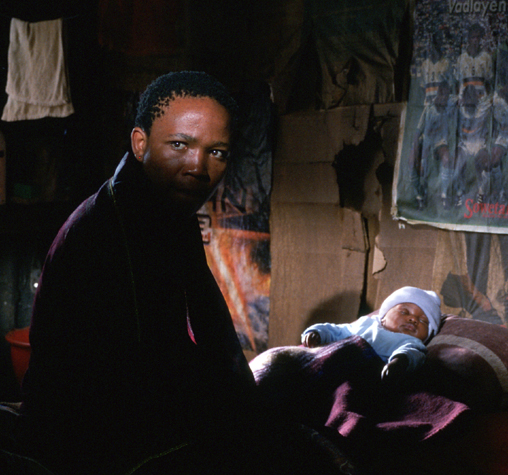 How did you or these
kids become actors and find the way to a better education coming from such
a tough world?
How did you or these
kids become actors and find the way to a better education coming from such
a tough world?
How does that work?
I think maybe by using poverty to channel myself for bigger things.
Sometimes it works out very well in terms of you look at other people and
you think, "This guy, okay, they are poor where he lives and his [business
is with crime] so I'm not going to be like him. I want to be someone
better." So it's just about doing something better with your life. But
some kids grow up in nice houses and go to good schools and still mess up.
They still have millionaires in Soweto.
Were you ever
attacked?
Yeah. I had been
mugged.
What were your
feelings about being attacked and how you reacted to it?
It was when I was
doing Hamlet and that was like two days before performance. So I was with
a friend of mine and we were walking to my flat and there comes these
three guys who hit me with the butt of a gun. I just saw a gun and I
started fighting I didn't even think that this is a fuckin' gun. So anyway
like after that I'm all bleeding, because I was fighting, it was impulse
and tomorrow is the premiere so I used that challenge. Luckily they just
took my bag and I had a t-shirt in it that said
"Stop Crime" and hopefully they got the message. So I used that trauma to
channel it into the character of Hamlet.
And I would assume,
for this film.
Yah, even this.
When you shot the
film in the ghetto how was the crowd control?
You mean in the
township there; the guys on the street were hired as extras and as runners
you know?
And as security
guards
[laughs].
They were excited
about the whole idea.
How would you
address your feelings about the issue of redemption in this film?
From an actor's
point of view what interested me about this redemption story is that I
think me as an actor – I'm a tool to make people feel. If I can get to
that level where I can make you hate me and make me love me again, I mean,
it's an achievement. So that means I'm able to do different kinds of stuff
and not just be this cold-blooded killer all the time. That's why I don't
really think I'll be typecast after doing this.
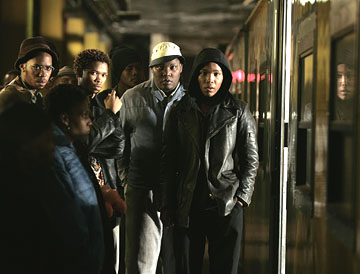 What are you doing
with this now?
What are you doing
with this now?
I don't know what
I'm going to do now but because of all the hype that I've been getting
from the media and all these awards and whatever, everybody's wants you to
be in their project. So me and my agent are trying to look at things
clearly so as not to fall into the whole thing. But I'd like to do a film
in Iraq or something.
You're going to the
Oscars. How do you feel about all the recognition?
For me it's a bit
overwhelming because I started a while ago, acting, theater and all that,
but three or four years ago I didn't even think I'd be sitting here with
you guys telling about this movie. I didn't think I'd be in this movie
winning all these prestigious awards. It's every actor's dream to be at
the Oscars. It's been a week or something after the announcement and I'm
still [in shock].
Are there actors you
think of as an influence and what would you say to them if you ran into
them at the Oscars; who do you want to meet there?
If I ever meet
Robert DeNiro I would tell him that I am a great admirer of his work and
I've followed him for years as an actor. I look up to guys like him
because I love theatre and think theater is a good base for any actor.
Then again, Charlize Theron, she's a sister of mine, she's from South
Africa. So I'd like to just say Hi and congratulate her on all her awards.
Was
Taxi Driver an
influence on you in doing Tsotsi?
No I didn't have
anything in the back of my head. I just tried to sort of start my own
thing. But I have watched all of DeNiro's movies as an inspiration to my
acting.
Are there any
African American actors you'd like to talk to?
Yes definitely.
Denzel Washington. I think he's a great actor. I like him.
Are there any other
urban actors or directors that intrigue you?
Obviously, Gavin
likes talking about Central Station [and its director Fernando
Mierelles].
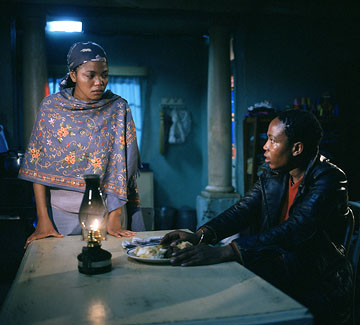 Were there any other
films Gavin recommended to you?
Were there any other
films Gavin recommended to you?
Not before we shot
the film but in Gavin's interviews he always talks about Central
Station. We are always compared to the Brazilian movie
City of God.
Have you learned a
lot from Gavin or are you sick of him by now?
Oh yes definitely, I
learned a lot from Gavin. And, no I'm not getting sick of him. I'm still
trying to grasp more information from him.
After this
experience, are you worrying about feeling a letdown?
I don't know what to
expect. With a film like this, that's doing so well, it's a pressure on me
as an actor. On my next project, what am I going to do? It has to be
really good. I have to keep the standard sort of. If it phases off, I’ll
have to pick up myself again and do something more.
Would you ever think
about moving from South Africa?
Definitely, for
greener pastures.
Where would you
move?
LA.
Of the films you've
seen out of South Africa, which ones would you recommend as important?
Yesterday.
That was nominated for the Oscar last year.
Are there any
directors besides Gavin that you've learned from?
Oh yes, Jason
Xenopoulos. He directed Promised Land [that came out in 2002.]
How does South
African music inform you? Especially the music in the film; was it around
you as you were playing the role?
Yes. Even before. I
listen to everything; I listen to Bob Dylan and to a whole lot of stuff.
It's an inspiration because sometimes when you're working on a character
you just play music and stuff. You try to do your lines and get all crazy
in the house. I listen to everything and I do listen to South African
music. It was essential in our film to be there because it is music from
the township. It has the energy. I think it worked out very well.
What songs would you
recommend people to listen to?
"Mdlwembe," which is
the opening song. It has a great township feel.
Have you seen a lot
of the South African films?
Yes, definitely.
There is a maturing
industry happening there.
Definitely. I think
the film industry back at home is growing. Yesterday, which as I
said, was also nominated for an Academy Award, and now it's Tsotsi.
Even if you're a young filmmaker, and you're not well established you get
that kind of enthusiasm looking at other people doing great stuff so it's
up to the next one to hold a flag up at the game next year.
There are a lot of
great films coming out from South Africa that haven't gotten the
recognition.
No, [you're right
and] that's why we do feel very lucky. I mean let’s face it. We did set
out to make the best film we could and work from the heart. But at the end
of the day it might've not worked; at a certain point you get lucky.